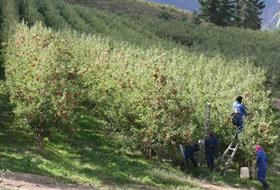
South Africa’s deciduous fruit industry has launched a R1.1bn land transformation plan which will see a major investment in new fruit orchards in the country.
The programme is set to be a major boost for job creation in the industry, and will add between 15-20 per cent to the existing hectares of fruit orchards in the country.
The Industry’s National Development Plan, with regard to economic development and land reform, will be conducted through its organised industry bodies and was announced today (6 March) along with the release of the Deciduous Fruit Strategic Sector Plan.
Pitso Sekhoto, chairman of the Deciduous Fruit Development Chamber, said that the Deciduous Fruit Industry has a high potential, both in terms of income generation and job creation. The new strategy will see the revitalisation of 120 existing hectares and at least 1,227 new hectares, of which 722ha will be apples and pears and 505ha stonefruit. The programme will be implemented over a five-year period.
“A programme to develop a further 2,000ha in the Free State in a partnership between the provincial Department of Agriculture, the industry and the private sector is currently being planned,' the industry announcement stated. 'The investment in land, plantings, equipment and infrastructure will be approximately R1.1bn.
“These plantings, linked to various private initiatives in the sector that have already been implemented, as well as a number of new programmes which are still in the pipeline, will add between 15-20 per cent of new hectares to the industry over the next 10-15 years,' the announcement continued. 'Between 6,000 and 7,000 new permanent jobs will be created on primary and secondary level during the next five years and up to 20,000 over the next 15 years, with further rural development through the provision of basic infrastructure and services.”
Sekhoto noted that there would be multiple constraints on the way to commercialising black farmers. These include aspects such as market compliance requirements imposed by private retailers, GlobalGAP certification and the cost of compliance, and transaction costs for reaching distant markets and access to funding.
“Whole-farm planning and value chain integration is fundamental to ensure long term success,' he outlined.
The DFDC-SA and Hortgro support would be based on proper profiling of each member of the DFDC’s farming enterprise, an increased production footprint of black farmers in the deciduous fruit industry, increased production efficiency and improved market access, Sekhoto conitnued. It will also focus on the integration of black farmers in the value chain, the development of profitable value-added enterprises and the graduation of black farmers to provide space for new entrants into the development sphere.
Nicholas Dicey, chairman of Hortgro, indicated that the new strategy caters for the support and facilitation of business plans for both 100 per cent black entities and equity initiatives, based on the guiding principles developed and endorsed by the industry, and he also stressed the importance of accessing and developing new markets.
“The additional volumes must have feasible markets,' he explained. 'Hortgro is working very hard in alliance with the other fruit exporting entities within FruitSA, in conjunction with various national Government Departments to ensure efficient processes to access priority markets in Africa and the Middle and Far East”.
Access to both commercial and low interest funding, customised and structured to meet the needs and requirements of emerging producers to underpin the industry's strategy, is being explored.
According to Dicey, a number of other dimensions of transformation are being dealt with by industry bodies in conjunction with various departments across the three tiers of government. These include solutions to farm worker and rural housing, risk mitigation including crop insurance, and a quick response process relating to disaster aid, rural services, and addressing various socio-economic issues, skills development and training.
It is also envisaged that social partners will agree and develop national, provincial and regional platforms to engage and deal with labour and other challenges transparently and equitably.
Apart from the portion of industry levy funding that will be utilised to provide basic capacity to roll out the strategy, there will also be involvement from resources and agrarian support measures and funding from the Department of Agriculture, Forestry & Fisheries (DAFF), the various Provincial Agricultural Departments, and the District Land Committee (DLC) structures and resources of the Department of Rural Development and Land Reform (DRDLR) - through which acquisition of land and selection of beneficiaries will be managed.



